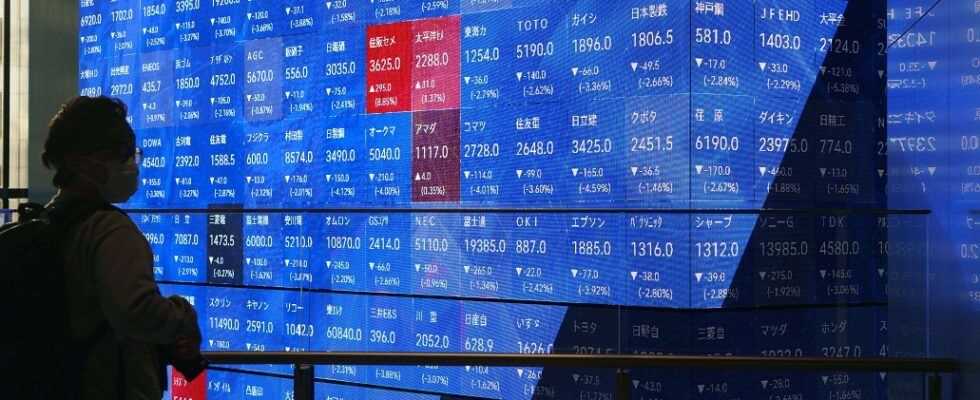Where the Paris Bourse is the best stock market student this year, with a Cac 40 up 29%, driven in particular by luxury goods, the Japanese Nikkei 225 has just closed 2021 up by only 4.91%, far from its bubble records of 1989, as major financial centers around the world soar from higher to higher. Thanks to the reopening of the economy, and supported by fiscal stimulus measures and a very accommodating monetary policy (liquidity injections by central banks through purchases of debt securities, interest rate at 0%), he MSCI World index, which brings together the largest companies in developed countries, has gained, for the moment, just over 20% since the start of the year.
As the Tokyo Stock Exchange (like Seoul, Frankfurt, Madrid, Milan, Stockholm, Oslo, Zurich or Sao Paulo) will keep its doors closed tomorrow, it is already time to take stock and compare. In general, the equity markets in Asia have underperformed globally, the region – factory of the world – having suffered again this year from the consequences of the Covid-19 pandemic, with partial containments and closures of factories or ports in China, South Korea, Vietnam and Malaysia. Countries where electronic chips are manufactured and which concentrate most of the world production of clothing.
Boycott against forced labor of Uyghurs
The blockade of the textile industry partly explains the plunge, on the Tokyo Stock Exchange, of nearly 30% of Fast Retailing, owner of the Uniqlo brand. The world’s seventh largest ready-to-wear group, which also owns the Comptoir des Cotonniers, Princesse tam.tam, Lulu Castagnette, Theory and Helmut Lang brands, had a good start to the year, with a record set in March. , but the return of restrictions, which resulted in sluggish growth in Japan and China over the 2020-2021 fiscal year ended at the end of August compared to an already very bad fiscal year 2019-2020, have changed the situation.

To make matters worse, in a world of finance increasingly converted to good environmental and societal practices, Fast Retailing, accused of profiting from the forced labor of Uyghurs in China, suffered a boycott by investors ESG and customers, who have the power to make their consumption a political act of disapproval.
This big name of “fast fashion”, which weighs heavily in the Nikkei 225 index, is at its lowest since September 2020 on the stock market. Soaring cotton prices have finished the work of undermining. Fast Retailing is the second weighting of the flagship index of the Tokyo index which has the particularity, like the American Dow Jones 30, of weighting the components according to their share price and not their capitalization.
The scars of the Chinese regulatory craving
Toyota (+ 32% in 2021) is the biggest Japanese company in terms of valuation (29,200 billion yen or 220 billion euros), but it is ranked only 19e in the rank of weights. The first place goes to Tokyo Electron, which supplies production equipment to semiconductor manufacturers and whose share, amid a shortage of chips and soaring prices, has gained more than 70% this year, for hit a record high of over 66,000 yen.
Softbank, third in the weightings chart, has plunged 32.5% this year. Because with shares in Alibaba or the Chinese Uber Didi, the holding company of Masayoshi Son, one of the world’s largest investment vehicles in “tech”, is certainly the best witness to the consequences of the regulatory craving for China against its too powerful technological industry. Alibaba has lost more than half of its value this year. The tumble began in November last year, with the cancellation of the IPO of Ant Group, the financial arm of the Chinese e-commerce giant. In May, Alibaba was fined a record 2.3 billion euros for violating anti-monopoly rules.
Subsequently, the Chinese regulatory crackdown spread to the video game industry, described as “Electronic drug”, which weighed on the share price of developers and publishers around the world, China being the world’s largest video game market. In Japan, Nexon, which announced this month to develop a new game based on the license of Games Workshops Warhammer: Age of Sigmar, is losing 30% over the year. It is also the consequence of the reopening of the economy whereas, last year, with the multiplication of confinements and calls to stay at home, the gaming industry had strongly progressed on the stock market. The health improvement made possible by vaccines also weighed on the health sector: M3, the best performance of the Nikkei 225 in 2020, has lost more than 40% this year.
Conversely, the reopening of the economy caused the share prices of shipping companies Nippon Yusen Kaisha (265%), Kawasaki Kisen Kaisha (+ 228%) and Mitsui OSK Lines (+ 171%) to soar. , which monopolize the podium for the best performances of the Nikkei 225 in 2021. A sacred comeback since the historic low of March 2020 (from x8 to x9 for Nippon Yusen and Kawasaki Kisen), but their low weight in the index has not gave wings to the Japanese index which, in the end, is just one better than the South Korean Kospi (+ 3.63%) or the Chilean Ipsa (+ 2% currently). The latter ended very badly the year after the victory of the leftist candidate, Gabriel Boric, in the presidential election on December 19; it loses 14.5% in dollars (-6% approximately for the Nikkei 225 in this currency). Only the Hang Seng in Hong Kong, where Evergrande has collapsed by 90% and Alibaba by 53%, and Bovespa in Brazil, undermined by soaring inflation and rising interest rates, are doing even less well.
